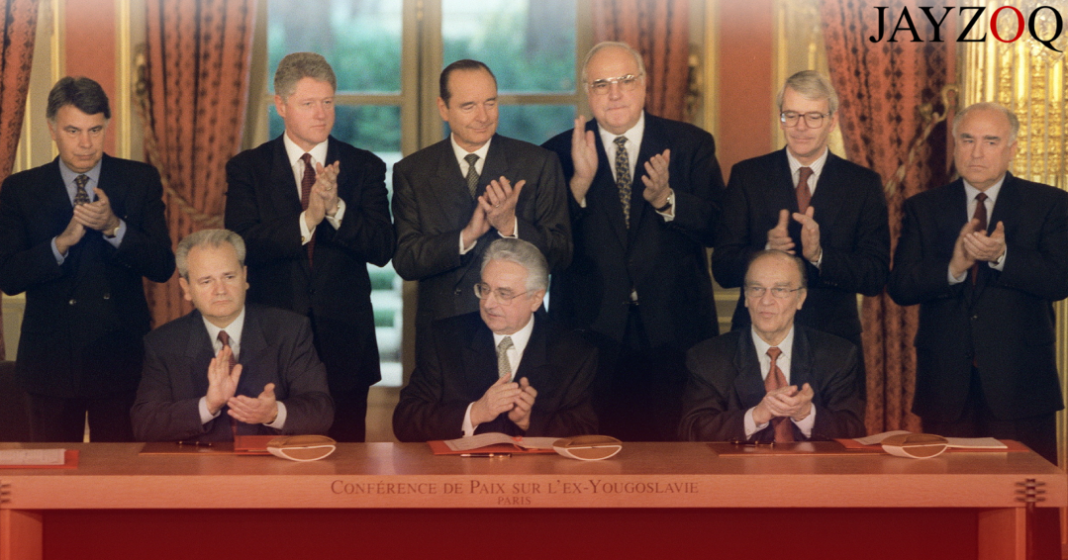The Dayton agreement, 1995
The year 1991 saw the independence of Slovenia and Croatia from the former country of Yugoslavia. In the wake of these events, Bosnia was getting ready to hold its referendum for independence. Bosnia, at the time, was made up of three major ethnicities, the Bosnian Muslims which are referred to as Bosniaks, the Bosnian Croats, and the Bosnian Serbs. The Bosniaks and Bosnian Croats voted for independence while the Bosnian Serbs vehemently opposed it since they considered Yugoslavia as their ‘motherland’.
Radovan Karadzic, the Serb nationalist leader in a famous address vowed to “take Bosnia to hell if it becomes independent”
What followed was perhaps one of Europe’s most brutal and bloody conflict since WW2. Serb forces put the capital Sarajevo under siege and the whole country plunged into chaos. The war saw gruesome incidents of ethnic cleansing and genocide done predominantly by the Serbs such as the infamous Srebrenica genocide which was the massacre of more than 8000 innocent Bosniak civilians. The end of the war was finally seen in the summer of 1995 with the US decision to intervene. This was soon followed by the Dayton agreement brokered and led by the United States along with NATO and the European Union. It divided Bosnia along ethnic lines. The Serbs were to be given a separate autonomous entity called the Republic of Srpska on the agreement that it would stay in Bosnia. Surprisingly it was allowed to keep the areas it had ethnically cleansed.
The division of Bosnia as per the Dayton agreement
Twenty-five years on, there has been some progress, it seemed as Bosnia was on the course to recover and rebuild what it had lost in the war. However, for the last 10 years’ any and all kinds of progress have been stalled. Nationalist politicians have once again begun to exploit the ethnic and religious divide. This is illustrated by the re-election of Serb nationalist Milorad Dodik, who threatens a ‘republic of Srpska exit’ from Bosnia. Moreover, he has implemented controversial policies such as the formation of a ‘reserve police’ which is seen as a threat to Bosniaks.
These policies undermine the Dayton agreement, and this has led to rising tensions. In the case that the Republic of Srpska breaches the Dayton agreement and secedes from Bosnia, it is very likely to face a huge international blockade and any country that tries to support it could face sanctions, but even if it did anyway it would gain little or no international recognition.
Although Russia and Serbia could naturally recognize and act as patron states to the rival influence of NATO, supporting the move could have massive consequences for both countries and they would certainly be put under international sanctions which would mean diving into a financial crisis.
Given these reasons, it seems hard to see how any move towards a declaration of independence could succeed. However, this does not mean that the rest of the world can rest assured, the mere fact that the Republic of Srpska’s leadership suggests that it could break away from Bosnia is enough to destabilize the country in various ways. Other countries such as neighboring Serbia and Croatia tend to exploit these ethnic tensions for their advantage. The fact that they haven’t fully recognized the country as a sovereign multi-ethnic state is part of the problem.
As a result of the political deadlocks and ethnic tensions, Bosnia hasn’t had any substantial progress economically and it hasn’t been able to join any transnational organizations such as the EU. Many in Bosnia still remember the dreadful Bosnian war and feel unsafe as the war might break out again. Many people see only one way out, which is through reforms in the Dayton agreement.
As it appears change in the Dayton agreement is desperately needed. It served its purpose of ending the war but ever since, it has shown its lack of effectiveness in leading Bosnia to the path of recovery and economic prosperity, instead it has been exploited by nationalist politicians and rival countries. A strong centralized government, reform in politics and education policies, along with a new constitution could help to make the country more stable and unified, followed by a better future.







